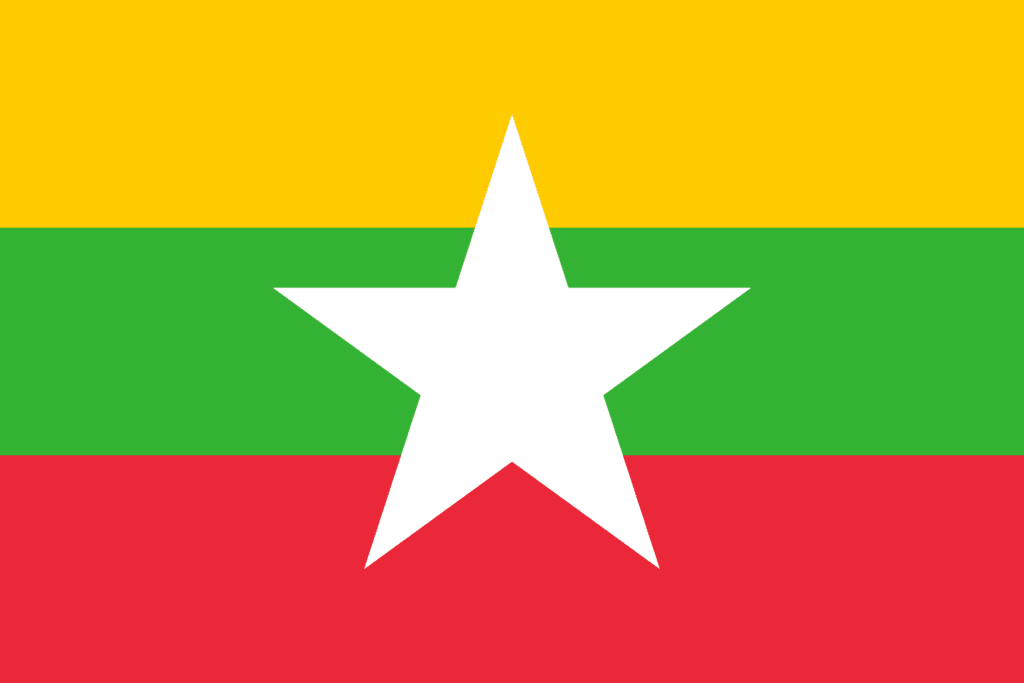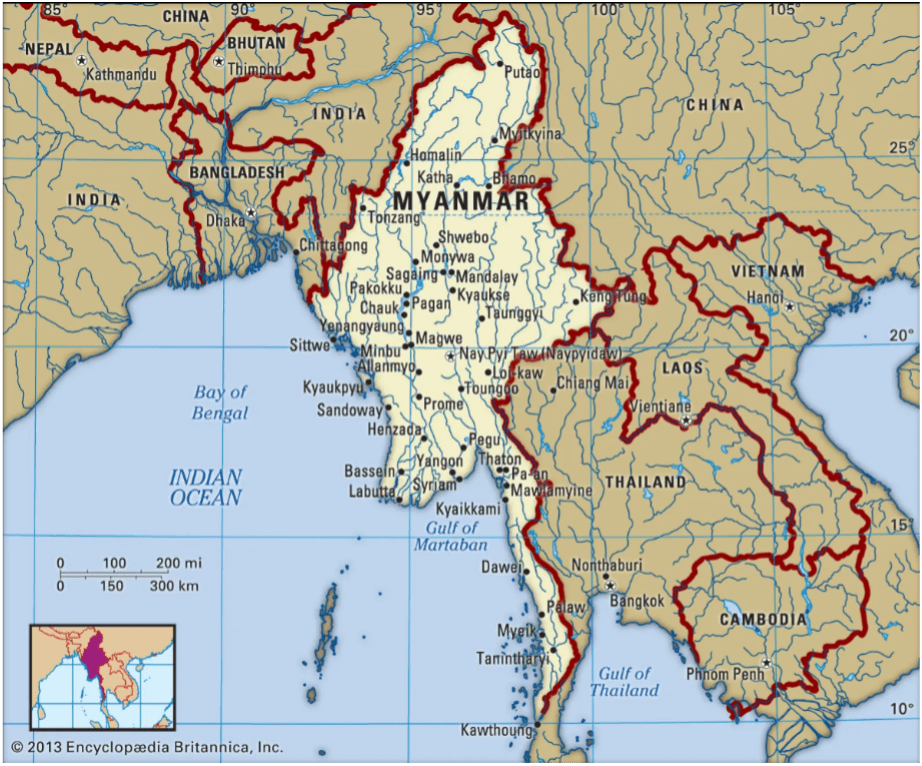
Myanmar
To trace biblical history we need to keep in mind, that at Babel, “…the LORD did there confound the language of all the earth: and from thence did the LORD scatter them abroad upon the face of all the earth”(Ge 11:9)
Britannica states “The local languages of Myanmar belong to three language families. Burmese and most of the other languages belong to the Tibeto-Burman subfamily of Sino-Tibetan languages. The Shan language belongs to the Tai family. Languages spoken by the Mon of southern Myanmar and by the Wa and Palaung of the Shan Plateau are members of the Mon-Khmer subfamily of Austroasiatic languages.
From Ge 10 (‘Table of Nations’) and research by Bodie Hodge there may be two lines of descendants involved. 1) via Japheth’s son Madai (Medes, Aryans, India) also Japheth’s grandson Togarmah, (some who moved to Mongolia, China and Russia), and 2) via Shem’s great-grandson Joctan’s 13 sons (Ge 10:26-29) populated Arabia, India, Indonesia and beyond?
PRAYERS FOR Myanmar
- Pray for front-line workers ministering in dangerous areas.
- Thank God that the church in Myanmar continues to stand strong.
- Pray for churches in Myanmar as they navigate political instability and uncertainty.
- Pray for the complicated political situation in the country.
- Pray for pastors and believers in the Wa region who have faced increased persecution and imprisonment.
- Pray for the evangelistic work among Rohingya Muslims.
More Prayers
- Myanmar’s military junta (1962-2011, 2021-) is a ruthless power. Their policies brought poverty to a land rich in resources. They squashed protests, put their opponents in prison, and implemented forced labour. A policy of cruel violence against certain minorities led to destroyed villages, rape, torture, displaced populations, and international condemnation. After an era of greater democratic governance, the military performed the third coup of Myanmar’s short history, on 1 Feb 2021. Widespread protests were met with murderous violence. Now, coalitions of anti-regime militias, many of them comprised of ethnic minorities, have made significant progress in the fight against the junta’s armed forces. Some say the regime is not far from collapse. Pray for what seems impossible except through Christ: the solidarity, peace, and courage represented by the three colours of the nation’s new flag.
- The Church faces many challenges in Myanmar. Pray about these issues:
- Limitations on the freedom to function as the Church, since many restrictions exist. Authorities generally disallow new church buildings from being constructed. The importation of Christian literature is severely limited. In many cases Christians are pressured or forced to convert to Buddhism.
- Nominalism and revival are simultaneous dynamics. Several generations after the arrival of Christianity through Adoniram Judson and others, it is to some more a tradition with irrelevant forms than a living faith. In some circles, Western humanism erodes the Bible’s authority. But at the same time, many mainline and traditional denominations find themselves in the midst of revival and renewal, which is happening across previously entrenched denominational lines.
- Most Christians are from minority groups that are embroiled in military actions against the central government. Pray that this may not cause bitterness, hatred of other peoples, compromise of their faith or blunting of a missions vision. Isolation, poverty and lack of training hamper the ability of these groups to be a witness, but this is changing.
- Buddhism is strongly entrenched among the Burmese majority as well as the Shan, the Rakhine and the Mon, and has deep influence among more animistic peoples. Burmese Buddhism incorporates much pre-Buddhist spiritism, occult beliefs, astrology and superstition, and devotion is strong. Most children are educated in monasteries, so the influence of Buddhist thought is pervasive. The Church must learn to understand and address the Buddhist mindset as well as minister in spiritual power if it is to see a harvest among this majority. But positive signs are there including a growing openness to Jesus, especially among the 700,000 monks. Many study the gospel and listen to Christian radio. Reportedly, thousands have quietly become believers; no doubt many more would also believe were there not such powerful cultural, social and spiritual constraints against leaving Buddhism. The government crackdown against the monks’ political demonstration reduced their influence to a degree.
- The least evangelized peoples. There are still many millions of unreached, and the need for bold but sensitive outreach and church planting persists. There is a young but encouraging movement to Christ that expresses the gospel in a framework sensible to Buddhists. It began among the Rakhine and moved to Burmese and Karen Buddhists. Pray for:
- The Bama (Burmese) peoples, staunchly Buddhist (only 0.1% Christian). It is not easy for tribal believers to witness to them due to years of mistrust; nor is it easy for the politically dominant Bama to receive the gospel from them without prejudice. Pray for conversions among this staunchly Buddhist people.
- The Shan are related to the Thai and live in the Golden Triangle area. Despite being primarily Buddhist, they suffered much in the wars with the military regime. Only 0.9% are Christian, and few have Bibles. The latest Shan Bible translation is available in print and digital audio.
- Other Buddhist minorities have few Christians – Arakanese/Rakhine (0.1%), the Palaung (0.2%), Mon (0.9%), Lu (0.2%), Yangbye (0.5%) and several smaller groups.
- The dozens of animistic peoples, many of whom are proving responsive to loving outreach. Pray for the emergence of vital church planting movements among all of them.
- The Chinese number over one million, but only about 2.5% are Christian. Long holding significant influence in Myanmar, a recent and massive influx of Chinese over the Yunnan border has caused resentment. The recent arrivals are less evangelized than Burmese-born Chinese. Mandalay is over one-third Chinese.
- The Rohingya of Arakan, Muslim descendants of Arabs, Moors, Moghuls and Bengalis who settled in Arakan 1,000 years ago. They are one of the most neglected and unwanted peoples on earth. They are denied citizenship and face numerous restrictions in their basic rights. Many have fled to neighbouring Bangladesh or emigrated illegally to other countries. There is little outreach to them. Pray for the few scattered believers.
- The nine Hindu peoples were long neglected. In 1928 the first church was planted among them, but they still are only around 1% Christian.
- Pray for the vast number of refugees/IDPs. In Thailand alone there are over two million Burmese (until recently, mostly for economic reasons), and more in Malaysia, Singapore and Western nations. Another 1.7 million are internally displaced, many from Christian areas, as a result of the regime’s violence and ensuing rebel activity. Both within Myanmar and among the diaspora there is increasing ministry and spiritual fruit, with many Burmese churches being planted. But many remain without the gospel, uprooted and far from home.
- The missionary vision of the Myanmar Church continues to grow and mature. A number of nationals serve the Lord cross-culturally. There are many Bible schools in Yangon, accounting for at least 1,000 students; most of these include mission as a key part of the curriculum. Pray for a willingness to serve in the rural villages and not just the cities, for genuine love across deep ethnic divides, and for good training so that the indigenous church is well equipped to evangelize the nation.
- Christian media ministry:
- Bibles and Christian literature are in desperately short supply due to import and printing restrictions. More Christian bookshops are opening in the cities (The Evangelical Literature Centre, CLC, others), but they are far from enough to meet the need. Too much unhelpful Christian literature from abroad only complicates matters. Pray for more culturally appropriate, well-translated, biblically faithful writings and that God would raise up Burmese writers to meet this need.
- Christian radio is very effective due to its mobility and privacy, with broadcasting in 35 languages. Major radio agencies and their broadcasting languages include FEBC (28 languages, including Bama/Burmese, totalling 76 hours/week) and TWR (Burmese, Karen, 11 hours/week). Also broadcasting are Adventist World Radio, Gospel for Asia and Radio Veritas Asia. Several others broadcast primarily in English. Pray for the production of programmes and the provision of equipment.





